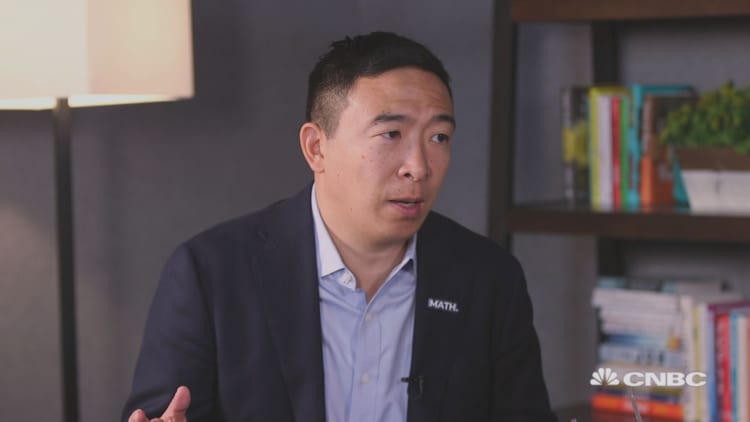
Some of the top contenders in the Democratic presidential primary have called for a wealth tax on America's biggest earners. But entrepreneur Andrew Yang, whose profile in the primary race has risen in recent months, told CNBC's John Harwood that the policy could be a "disaster in practice."
Yang's campaign is built around a starkly different, though no less bold, plan to overhaul the economy: a so-called universal basic income in which all U.S. citizens receive $1,000 a month with "no strings attached."
Yang says the plan, which he calls a "freedom dividend," would protect the jobs and well-being of Americans whose livelihoods are threatened by automation and technological innovation.
Progressive candidates in the top tier of the primary have called to raise taxes on the wealthiest Americans to pay for a bevy of social programs, such as "Medicare for All" and tuition-free college.
Sen. Elizabeth Warren, D-Mass., who is threatening the front-runner status of former Vice President Joe Biden, proposes a 2% annual tax on wealth of more than $50 million and a 3% tax on wealth over $1 billion. Sen. Bernie Sanders, I-Vt., a self-described democratic socialist, announced an even bigger tax on the rich in September.
"I understand the spirit of it and the intent of" the wealth tax idea, Yang told Harwood. "But I agree that it would be somewhere between problematic and a disaster in practice."
Read the exchange from Harwood's Speakeasy with Yang below:
Harwood: The Republican economists I talked to who praise the efficiency of what you proposed contrasted it with the wealth tax that Sanders and Warren have talked about. They say it just won't work, won't raise the money, will trigger a lot of evasion. There are measurement problems. Do you think the wealth tax is a bad idea?
Yang: I think the wealth tax is an idea, in spirit, that makes sense, given the wealth distribution. But in practice it would have massive implementation problems. There would be capital flight, wealthy people would renounce their citizenship. And the bigger problem isn't even the money. It's the annual inventorying of their assets. The truly wealthy in this country have zero interest in submitting to an annual audit of all of their assets. They barely know what all their assets are. And the last thing they're going to do is report them every year and then pay a toll. So you would have massive compliance problems. And to me there are better ways to make this economy fair, though I understand the spirit of it and the intent of it. But I agree that it would be somewhere between problematic and a disaster in practice.


